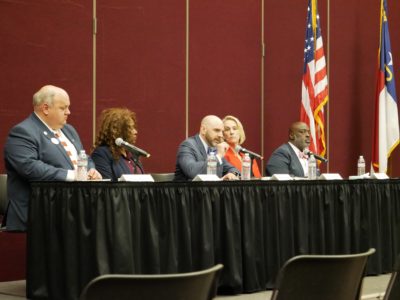In 2019, EdNC.org began holding student town halls at community colleges across North Carolina. In January, we expanded access to the town hall experience with a virtual town hall that allowed community college students to share their opinions on the issues that matter most to them. The virtual town hall received more than 5,000 responses from 350+ community college students. Click here to view the results.
North Carolina’s lieutenant governor has a seat on the state board of community colleges. So, we asked candidates for the office to respond to any or all of the issues identifies in the town hall, or any others impacting community colleges that would be a priority for their tenure.
Community colleges serve as the bridge between students and the jobs of the future. They should be affordable, nimble, and an integral part of the communities they serve. I agree there should be more grants and scholarships for community college students and that is why I supported Gov. Cooper’s plan, NC GROW, which would pay the last dollar of tuition at community colleges.
I would also work for increased financial assistance for students pursuing non-credit, short-term workforce credentials and offer emergency assistance for students whose education might be interrupted by everyday life events.
Finally, we must increase funding for childcare vouchers and Smart Start, so students can pursue their careers knowing their children are safe and well-taken care of.

To effectively help students move into the workforce, community colleges need to bring potential employers onto their campuses to help design real world curricula and match student strengths with job opportunities. The role of lt. governor not only includes a seat on the community college board, it includes participation on economic development boards as well. As lieutenant governor, I will leverage those relationships to anticipate future employment trends and provide pathways for students to well-paying jobs.
I would also work to develop more employer sponsored apprenticeships and internships so that students can be getting valuable work experience while they are still in school.
Just as Gov. Cooper and I will work to fund last dollar tuition for our community college students, we must also explore ways to provide healthcare to students while they prepare for their future. Expanding Medicaid would cover adults at and below 133% of the federal poverty line and would bring premiums down for those who have insurance. As a former Affordable Care Act Navigator, I understand how important healthcare is, and as a legislator I have filed legislation to expand Medicaid and tackle the cost of healthcare.
As a member of the NC State Board of Community Colleges, I will work with other members, the legislature, and the governor to help make these healthcare costs as low as possible.
I have sponsored legislation which would expand broadband in North Carolina. This question is a prime example of why we must invest in this technology. It is not okay that our students in eastern and western North Carolina are disadvantaged to their peers in Charlotte and Raleigh.
As a first generation college student who experienced the college transfer process myself, I believe that while our courses should be thought provoking and challenging, the process of enrolling, registering, and transferring should be simple. Students should know, prior to class registration, if course credit will be fully transferable and applicable for graduation requirements.
I will advocate for increased transparency in the reciprocal agreements between our educational institutions, support increased funding and training for the counselors and transfer specialists at our community colleges who engage in this important work, and will meet with stakeholders to identify and isolate the gaps that our students face as they transfer.
Postsecondary education needs to be affordable. Gov. Cooper’s proposed NC GROW would be one way to address that need by covering the costs of last-dollar tuition. We also need financial assistance for students pursuing non-credit, short-term workforce credentials.
Community college students are frequently part-time, dealing with the stress of employment and family responsibilities, while at the same time trying to better their lives. Streamlining admission, matriculation, as well as procedures for applying for financial aid, are all important strategies for ensuring student success.
North Carolina used to be a state that made education our top priority, we need to be that state again.




